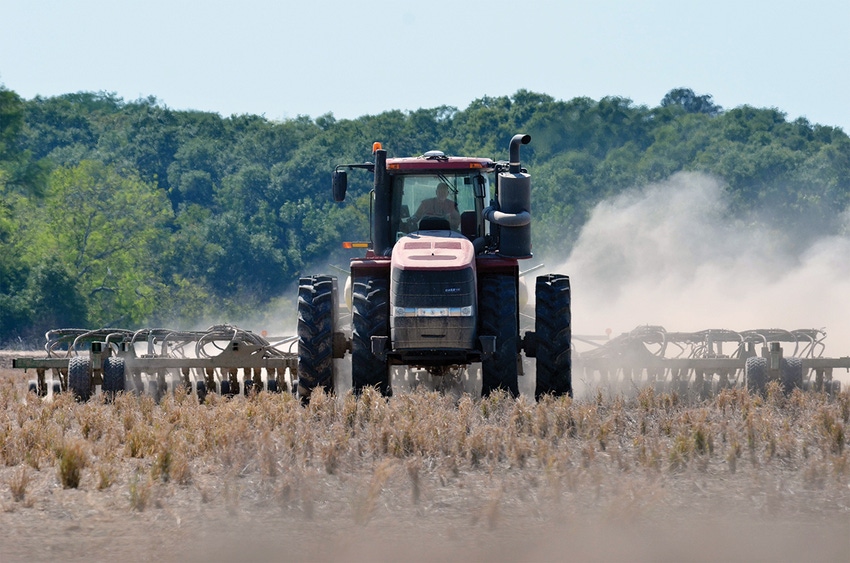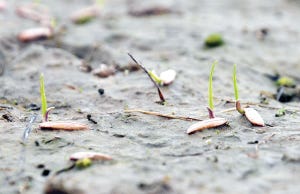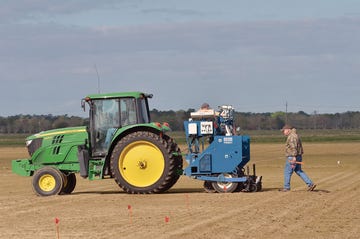April 7, 2016

Good weather set the stage for good planting conditions for the 2016 rice crop in Louisiana. “In general, we’re off to a good start,” said Steve Linscombe, director of the LSU AgCenter H. Rouse Caffey Rice Research Station in early April. “I think this has probably been the most favorable growing conditions in the month of March in my career.”
Some farmers were finished planting as early as March 7, he said.
Linscombe said most farmers appear to have good stands, with only a few scattered fields needing to be replanted.
The bird repellent AV-1011 is working well at preventing birds from eating rice seed, he said. “This has been an outstanding product for us.”

Rice seeds spread onto a field by airplane have sprouted a few days after planting. Photo by Bruce Schultz
Rice seeds spread onto a field by airplane have sprouted a few days after planting. Photo by Bruce SchultzUnlike last year, rains kept farmers out of fields for only a few days, he said.
All research projects on the Rice Research Station are on schedule, with a few plots remaining to be planted.
Louisiana’s rice crop could increase over last year’s 412,000 acres, Linscombe said. It may be too late to replant flooded corn fields, and a portion of that land could be used to grow rice.
“By the end of the week, there won’t be too much left to plant in southwest Louisiana,” said AgCenter rice specialist Dustin Harrell.
Planting started in early February, and Harrell estimated a third of the crop had been planted before March 10. Favorable weather this year, unlike 2015, allowed farmers to drill-seed more of their rice.
Farmers prefer to spread their planting over a few weeks to prevent the rice from ripening and reaching desired moisture levels all at once, Harrell said.
“I feel we’ll be close to the acreage we had last year,” he said.
Not much rice has been planted in northeast Louisiana, and Harrell expects it wwould be at least two weeks before it gets fully under way. “A lot of that ground is still underwater,” he said.
Andrew Granger, AgCenter county agent in Vermilion Parish, said planting is 80 percent complete there.
Farmers who haven’t finished are probably still harvesting crawfish, or they don’t typically plant early, Granger said.

Research associate James Leonards, right, walks behind a planter being loaded by LSU AgCenter agronomist Dustin Harrell. Photo by Bruce Schultz
Research associate James Leonards, right, walks behind a planter being loaded by LSU AgCenter agronomist Dustin Harrell. Photo by Bruce SchultzVermilion Parish rice acreage is likely to decrease by about 10 to 15 percent this year to around 40,000. “The price is the drag,” he said.
Todd Fontenot, AgCenter county agent in Evangeline Parish, said farmers are taking advantage of the good weather. “If they’re not finished planting, they’re going to be finished this week. It’s moving along pretty fast,” he said.
Fontenot estimated 65 percent of the fields are planted and doesn’t expect an acreage change from 2015 in Evangeline Parish. “We’ll be pretty much in line with the 40,000 acres last year,” he said.
Jeremy Hebert, AgCenter county agent in Acadia Parish, said planting is nearly finished. “It’s going very, very well, with extremely favorable growing conditions,” he said.
Farmers are pleased with the stands. “It seems like everything planted has germinated,” Hebert said.
Acreage will be at least the same as last year’s 82,000 acres, he said. “I haven’t heard of anybody reducing rice acreage.”
Frances Guidry, AgCenter county agent in Jefferson Davis Parish, said planting has gone smoothly. ”Some are done. Some actually were done in the middle of March,” she said.
Farmer Johnny Hensgens of Calcasieu Parish said he only has 100 acres remaining, and he will be finished by week’s end.
He finished planting last year in March. “I could have finished in March this year, but I held off,” Hensgens said.
He said some of his seed seemed reluctant to emerge after cool temperatures that followed rain, but he didn’t have a problem with blackbirds feeding on seed because he used AV-1011. Two neighboring farmers who didn’t use the product had blackbird problems, he said.
Farmer Clarence Berken of Jefferson Davis Parish said his planting went well. “We couldn’t have had any better weather in terms of getting it out there and getting it done,” he said.
Berken said he finished planting earlier than ever. “I think everybody is satisfied with the way things have gone.”
Steve Linscombe can be reached at 337-788-7531 or [email protected].
Dustin Harrell can be reached at 337-788-7531, 337-250-3553 (cellphone) or [email protected].
You May Also Like




